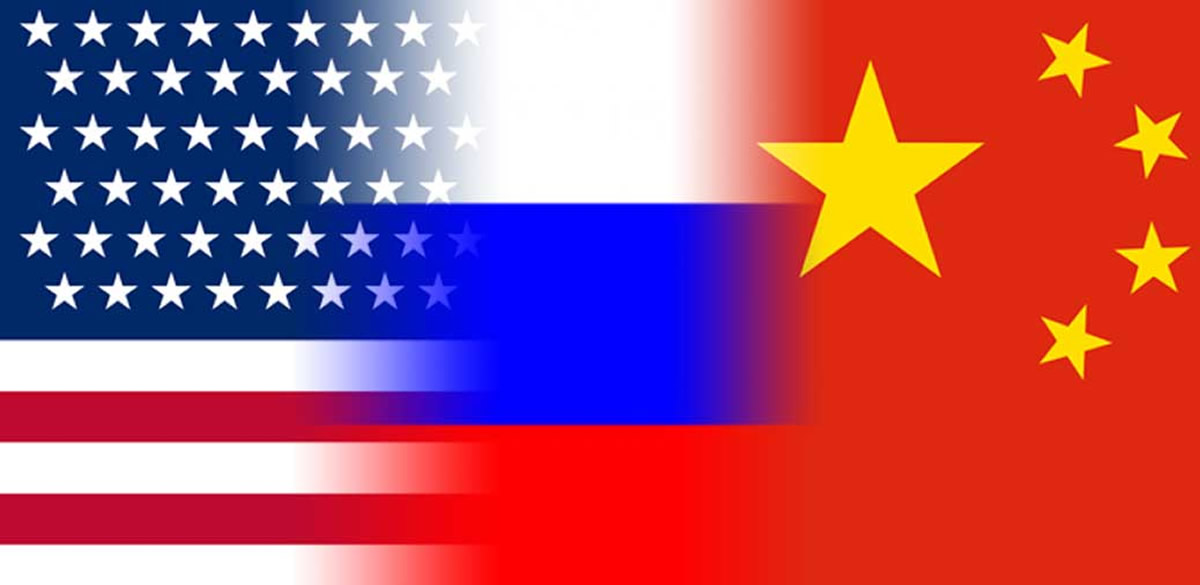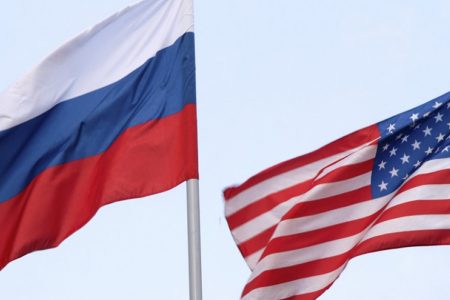-
In dealing with China or Russia, who would be a better candidate, Hillary Clinton or Donald Trump? And why?
Trump. His worldview is more similar to Putin’s one. Trump with his America First view will avoid confrontation with Russia just like Neocons and left-wing interventionist do now. Neocons see Russia as evil and the enemy because of their 80’s Cold War mentality and don’t realize Russia is no longer Communist nor expansionist like the Soviet Union. Asserting historical or ethnic rights in his backyard is in no way global expansionism like the old Soviet Union but Neocons cannot see nor understand that.
Also left wing interventionist see Russia as evil because they can see Russia’s defense of traditional values, something a radical “centrist” or left wing interventionist cannot tolerate. As per China Trump policies will also be better as he will try to reverse some of the policies that gave China the trade advantage by sacrificing US manufacturing jobs and industry. Clinton moves by ideology, Trump by pragmatism and that is the difference.
-
In your opinion does the United States have a better relationship with China, than China’s relationship with Russia? Is the relationship between Russia and China one that threatens western countries and NATO? Does China trust Russia despite Russia’s alliance with India (another Geo-strategic player) trying to influence their presence in south central Asia?
Russia and China compete for leadership, for terrain and influence among their borders, for customers for their weapons, etc. Still they are strategic partners in the global sense and they know that is more important than their local or internal conflicts. An over aggressive policy of the US and NATO have moved Russia and China closer than ever and to cooperate more than ever before. They know that if they remain united and supporting each other, the US and NATO will not be able to corner them.
If they separate, then they are easy targets. As per open sources, that is why Russia moved to China to expand its energy industry once the sanctions came. That is why they look for each other interests at the UN security Council where both have veto power. This does not means that Russia and China are not engaging with other partners to expand their opportunities: Russia looks into India, Brazil, the Central Asia countries, etc., and China looks very aggressively into Africa. Still the over-aggressive (and somewhat naive) policies of the Western countries have placed Russia and China together as never before.
-
The United States seems to be on a collision course with China and Russia. China has an Active Frontline Personnel 2,335,000 and Active Reserve Personnel of 2,330,00 soldiers; Russia has an Active Frontline Personnel of 766,055 and an Active Reserve Personnel of 2,485,000 soldiers. Hypothetically, if United States declared war to Russia and China, could it realistically cope with personnel based on military numbers? Who would win?
Most likely no war will come. That would be suicide for all players. What can happen are proxy wars and a cold war environment. That is possible and very realistic. But there is extremely low probability of a real war between the US and Russia/China. That would be a catastrophic scenario because the US conventional power might move the others to use their nuclear options and that would very likely destroy the planet or very close to it. As per open sources, the superiority of the US military can push less powerful opponents to nuclear option and then US nuclear retaliations, which means the destruction of the world as we know.
-
United States military budget amounts to about 5x that of Russia and about 3x the amount of China. There is a considerable gap between military budgets. What parts or sectors of the military budget does China and Russia mostly invest on?
The US military is far more powerful than the Russian or China one. The US is defending its status as global superpower with military presence in all continents. Russia and China, as global powers are regional powers of the first order but still regional. Russia focuses in Europe (and recently in the Middle East) and China in east Asia and its China Sea. As per open sources, their military are powerful as they are really design to fight in their regions and project at the regional level while the US must project its military power everywhere in the world.
Russia and China will place their priorities in modernization of their forces, technology and keep their nuclear arsenal operational. At the end their nuclear arsenals are their insurance of independence and ultimate survival as no one will dare declare war to them for fear to their nuclear weapons (for the same reason India does not destroys Pakistan conventional forces even when it can… for fear to a total destruction nuclear war)
-
How well trained are Russian and Chinese soldiers compared to American soldiers?
As per open sources the US has the advantage of real fighting and real missions which is the best training a military can have. Plus the US has the most powerful and modern weapons and most resources. The US is fresh from Afghanistan, Iraq, special forces advising missions in Syria, etc., exercises in South Korea, etc. Now Russia is increasing its training tempo in Europe to send a message to several European countries, mostly the pragmatic big countries there like Germany and France, and now also Russia has the benefit of real combat missions in Syria. China follows with patrolling and low intensity mission in the China sea.
-
Do you fear a war with China and Russia is imminent? Is the US government afraid of Russia and China’s military threat?
No, it is not imminent. Very low probabilities. At most we can see a proxy war, animosity and cold war but no real military conflict among those powers. Despite the US extraordinary power, a pragmatic, non ideological US President must avoid at all cost a conflict that might escalate into a nuclear one.
-
Does China and Russia have destructive weapons with long range capability? Do they have any new generation weapons that could poses a problem?
Yes, it is open sources and public information that China and Russia have nuclear weapons and long range intercontinental missiles.
-
It was said in 1999, that China and Russia were lagging 20 years behind United States based on military technology and hardware. Where they really that far behind in military advancement? How far are they now compared to the US?
As per open sources, they were behind on budget and capabilities. They keep themselves pretty good into the “technology” field as technology is a priority and their space programs always demand the latest one.
-
Vladimir Putin has recently created a Praetorian Guard to protect him. It is said the reason behind the creation of his new private military is because Putin fears Sergey Shoygu the minister of Russian defense could exert control of the government. Is this rumor true? And why should he be afraid of Shoygu?
The National Guard is not private but a military internal security force very similar to the Italian Carabinieri, French Gendarmerie, Spanish Guardia Civil, etc. It is a militarized internal force similar to the one that many countries have. Their main mission is defend the country from internal instability. From open sources, Putin has nothing to fear fear from his Defense Minister. The timing of the creation of the National Guard suggest two purposes: make stronger the foundation of the state by actually increasing the capabilities that until now the FSB and some Interior Ministry departments had by adding a force who can actually control the terrain in a military way and fight hypothetical insurgents and terrorists in the open and secondly send a message to any country that might try to promote or pay for a coup or color revolution in Russia as telling them “don’t even think about it”. Looking as scenarios in Syria, Libya, Egypt, Tunisia in 2011 and Ukraine 2014 it is logical that Russia wants to completely seal the state against internal instability and prevent any foreign finance “revolution” in its soil.
-
A similar report states that all the sea and airspace violations conducted in several different waters around the world by Russian ships and aircraft were provoked by Shoygu, and not Putin. What is your view? And if so, why is he violating airspace and international waters around the world?
As per open sources, any aggressive border maneuver most likely sends a message to the pragmatic countries: keep your distance, don’t make things worst by following the Hawks and Russo phobic. That is a message that has 0% chance with the Russo phobic border countries but resonates well in the cooler heads of the German and French. Any policy has to be most likely approved by the Head of State.
-
China recently set their first military base in Djibouti, for $20 million dollars and will stay for 10 years. They will share the location with Japan and the United States. With China in the mix, what does it mean for Japan and United States? Will it have a volatile effect on the region?
As per open sources China is looking to expand its influence in Africa and that is pushing its presence in Djibouti and other countries. It is most likely looking for cheap resources. Japan and the US will have to compete for the favor of the African countries.
-
China controls the Gwadar port in Baluchistan, and now has Djibouti. Is their goal to control the Indian Ocean and the Red Sea? And if so with what porpoise?
As per open sources, China has a very strong relationship with Pakistan. China contingency plans for a war with India includes binding Pakistan to open a second front. That translates in a strong economical and political cooperation other than the military one. China wants to develop its border with Pakistan and expand its potential there to include a corridor to the sea. That is the main purpose of its activities in Pakistan. As per Africa, China looks for expansion like any other great power and is looking for cheap resources.
In the long run how will United States cope with Russian and China’s expansion throughout different regions around the world? Most likely no unless there are political changes in both the US to look for more pragmatic approaches.
-
The Pentagon suspects Russia and China have hacked the Pentagon on numeral occasions. What is the goal of China and Russia hacking the Pentagon? What are they trying to find? Have they been successful?
As per open sources the US Government has been under cyber attack several times. In military and international doctrine great powers do peace time cyber attacks on others to test capabilities, disturb operation and send political messages.
-
Former Pentagon Defense Secretary Robert Gate believes countries like Russia, China and Iran may have hacked Hillary Clinton’s unsecured email server. If indeed the story is true, should Hillary Clinton be indicted? Is there any resemblance between Clinton and Eric Snowden or Bradley Manning?
As per open sources the FBI said Clinton was negligent but was not criminal in her use of private server. Snowden and Manning committed criminal offenses while Clinton was only negligent and showed poor judgment.
-
Do you see global shift in powers anytime soon?
No, I see the future as in a multi-polar world as I predicted in Pravda back in 2003. China is now a great power, and Russia has come back from the ashes of the 90s to become a great power again. The world now is set as multi-polar as I explained back in 2003.
*Interview originally published by The Daily Journalist.



